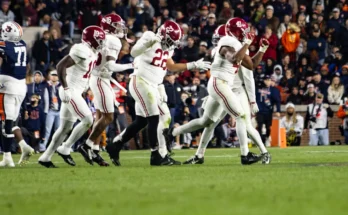Boston Celtics Star Derrick White Reveals Blake Griffin Was The True Glue Guy And Biggest Loss Despite Departures Of Key Veterans
The Boston Celtics have endured their fair share of roster shake-ups in recent seasons. This offseason alone, the storied franchise has said farewell to cornerstone pieces like Kristaps Porzingis, Jrue Holiday, and the ever-reliable veteran Al Horford. Each departure felt significant in its own right, sparking debates about how the Celtics would retool and whether they could continue chasing championships with a reshaped roster. Yet, for all the talent that has come and gone, Celtics guard Derrick White recently suggested that the team’s most impactful departure wasn’t a perennial All-Star or a major rotation piece. Instead, it was a player whose numbers hardly told the full story: Blake Griffin.
On his podcast, White peeled back the curtain on Griffin’s short-lived but surprisingly powerful tenure with Boston. While Griffin may have been past his All-Star prime by the time he arrived for the 2022–23 season, his role extended far beyond the hardwood. White revealed that Griffin quickly became the glue of the Celtics’ locker room, someone whose personality, humor, and professionalism helped bind a group of highly competitive athletes together during a critical stretch in the team’s pursuit of a championship.
“Blake was unbelievable for us,” White recalled. “Even though his minutes weren’t what they used to be and he wasn’t the high-flying Blake people remembered from the Clippers days, what he brought to our locker room was irreplaceable. He kept us together.”
That sentiment might seem surprising at first glance. After all, Griffin averaged just four points per game during that season in Boston. From a purely statistical standpoint, his contributions were modest. But as White explained, his intangible impact was immeasurable. Griffin was the guy joking around during tense stretches, taking the first bus like a rookie to set an example, and consistently reminding his teammates not to lose sight of the bigger picture.
One story White shared stood out as a defining moment of Griffin’s leadership. At a team dinner, Griffin pulled him aside and gave him a compliment that White never forgot. “He told me, ‘I didn’t realize how good you were until I was on the team with you,’” White said. “That meant everything to me. When a guy like Blake, who’s seen it all and played at the highest level, says something like that, it gives you confidence. It made me feel like I belonged at that level.”
That gesture exemplified Griffin’s role with the Celtics. He wasn’t the star of the show anymore, but he found purpose in elevating those around him. For a Celtics team striving to finally get over the hump after years of playoff heartbreak, that type of encouragement and unity proved invaluable. According to White, Griffin’s ability to connect with every player, from superstars like Jayson Tatum and Jaylen Brown to role players fighting for minutes, kept the group cohesive during an emotionally taxing campaign.
The Celtics of that era were already blessed with talent. Tatum was ascending into superstardom, Brown was solidifying himself as an elite two-way force, and veterans like Horford provided steadiness. But championship teams often need more than sheer talent. They require chemistry, camaraderie, and a sense of belonging that keeps everyone pulling in the same direction. That’s where Griffin came in.
White noted that Griffin’s decision to take the “first bus” — the one typically reserved for rookies and end-of-bench players — was symbolic. “He didn’t have to do that. He’s Blake Griffin, a guy who was once the face of the league. But he wanted to show that he was part of the team, that no one was above anybody else. That kind of thing might seem small, but it goes a long way.”
It’s a stark reminder that leadership doesn’t always come in the form of highlight reels or stat lines. Sometimes, it’s the quiet moments, the jokes in the locker room, or the well-timed words of encouragement that make all the difference. Griffin, who had spent years as the focal point of franchises in Los Angeles and Detroit, transitioned seamlessly into a new phase of his career in Boston. In doing so, he demonstrated that greatness isn’t just about what happens on the court, but also about how one influences the culture around them.
White even went as far as to say that the entire team wanted Griffin back after that season. “Everybody loved Blake,” White said. “We were all hoping he would come back because we knew how much he meant to us. He was just an unbelievable teammate.”
The Celtics ultimately fell short of their championship aspirations during Griffin’s lone season with the team, but his impact lingered. For White, the loss of Griffin stands out more than the departures of stars like Porzingis, Holiday, or Horford. Those players will be remembered for what they provided on the floor, but Griffin’s influence existed in the unseen spaces — in the bonds between teammates, in the atmosphere of practices, and in the belief he instilled in others.
Griffin’s story with Boston also highlights a broader truth about the NBA: veteran presence matters. The league is often dominated by discussions of star power, scoring averages, and advanced metrics, but the behind-the-scenes dynamics can be just as important. A team with talent but no cohesion can falter under pressure. A team with both talent and unity, however, often finds itself competing deep into the postseason.
For Griffin, who had already accomplished so much in his career — multiple All-Star appearances, a Rookie of the Year award, countless poster dunks — the ability to pivot into a mentor and morale-booster role is a testament to his adaptability and self-awareness. Not every star embraces that shift gracefully. Many struggle with reduced roles or fade quietly out of the league. Griffin, by contrast, leaned into his new identity and left a lasting mark.
Fans might look back at Griffin’s Celtics tenure and see a statistical footnote, but White’s revelations show that the story is far richer. His presence served as a stabilizing force during a season filled with high expectations and relentless pressure. His humor lightened the mood, his humility inspired teammates, and his words empowered players like White to step up with confidence.
Now, as the Celtics navigate another transition period without familiar faces like Porzingis, Holiday, and Horford, White’s comments underscore the importance of not overlooking the intangibles. Talent wins games, but chemistry wins championships. And sometimes, the player averaging four points a night is just as vital as the one putting up 25.
Griffin’s legacy in Boston may not come with banners or statistical accolades, but within the walls of that locker room, his influence remains undeniable. For White, and likely for many others who shared that season with him, Griffin’s impact serves as a reminder that greatness is about more than what fans see on the scoreboard. It’s about leadership, connection, and the ability to bring out the best in others.
In the end, that’s why Derrick White considers Griffin’s absence one of the biggest losses the Celtics have experienced in recent years. Bigger than the departure of a 7-foot unicorn in Porzingis. Bigger than the exit of a defensive maestro like Holiday. Bigger even than saying goodbye to a battle-tested veteran like Horford. Because while those players left their marks on the court, Blake Griffin left his on the hearts and minds of the team itself.
And that, perhaps, is the truest definition of a glue guy.



